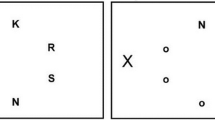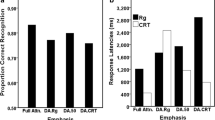Abstract
Short-term serial recall performance is strongly affected by the nature of the items to be remembered. For example, memory span declines with decreasing speech rate (i.e., increasing pronunciation duration) of the items and, for a given speech rate, memory for non-words is poorer than for words. Similarly, words of high natural language frequency are recalled better than low-frequency words. Existing descriptive models have identified redintegration as underlying many of those effects. Redintegration refers to the process by which partially retrieved memorial information is converted into an overt response. This article presents a process model of redintegration based on a non-linear dynamic network, which is shown to handle the effects of speech rate, lexicality, and word frequency on memory span. Unlike previous descriptive efforts, the redintegration model also predicts the shape of the underlying serial position curves.
Similar content being viewed by others
Author information
Authors and Affiliations
Additional information
Received: 1 October 1998 / Accepted: 28 December 1998
Rights and permissions
About this article
Cite this article
Lewandowsky, S., Farrell, S. A redintegration account of the effects of speech rate, lexicality, and word frequency in immediate serial recall. Psychological Research Psychologische Forschung 63, 163–173 (2000). https://doi.org/10.1007/PL00008175
Issue Date:
DOI: https://doi.org/10.1007/PL00008175




